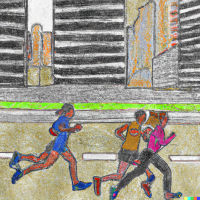Running Injury Prevention - The Nine Tips to Erase Injury Problems Forever
From sprained ankles to shin splints, from Achilles tendinopathy to ITB syndrome, running injuries can seem like an inevitable part of the runner's journey, right?
The topic of this page, running injury prevention, will shine a much-needed glimmer of hope if you are worried about being stopped in your tracks, literally.
I have listed nine injury prevention tips here. It's quite a lot. Some of them are short and punchy. Others require a bit more text and explanation. Whatever you do, make sure you check out the last tip, it's probably the most important one of all of them.
Running Injury Prevention Tip #1: Why Do Running Injuries Occur?

Quite a few of my injuries in the past where driven by increases in mileage. It's a tricky balance. We want to improve ourselves and we know that running more helps with that. At the same time we need to manage our fragile bodies and give it a chance to recover.
So, before you go ahead and transform yourself into the next Usain Bolt, or aim to run the length of a Marvel movie, the build-up in mileage and intensity should be gradual. This approach allows your body to adapt to the increased strain and prevent injuries. Think of it like upgrading your car's engine to a larger capacity. You wouldn't want to push it to its maximum speed immediately, would you?
New to running? A slow and steady walk-run routine can be your best friend. The gradual progression not only enables your body to adapt effectively but also boosts your confidence. Winning!
Even when you are not into run/walks and just want to run, a slow and steady progression remains your best recipe for success. Also check out the Increasing Mileage Safely page for further information.
Running Injury Prevention Tip #2: The Significance of Strength Training

Remember, running isn't just about your legs. It's a full-body workout! A strong core, in particular, can help prevent injuries by improving your stability and overall form. So squat, lift, and crunch your way into a stronger supporting structure for your runs.
I have noticed a massive difference in the number of running injuries and the severity of running injuries since I have started doing strength training. I tell you all about it on my Strength Training for Runners page!
Running Injury Prevention Tip #3 - The Importance of a Proper Warm-Up

Warming up increases blood flow, loosens joints, and primes your muscles for the movement ahead. This is why it is crucial to ensure that your warm-up routine is as second nature as brushing your teeth. This simple routine can play a significant role in running injury prevention.
Traditional warm-ups can involve hitting the pavement immediately and easing into an easy run, but dynamic warm-ups (think high knees and butt kicks) can offer more benefits, as they engage all the major muscle groups. So spend 5-10 minutes prepping your body before every run; it's time well spent!
For everything you need to know about the best way to warm-up, check out my page about running stretches.
It includes tips for what to do before and after a run and includes some good stretches, that should help prevent issues with shin splints, Achilles and calf troubles.
Running Injury Prevention Tip #4: Shoes are Your Sole-Mates

Just as Cinderella's romantic fate hung on the perfect glass slipper, the wrong running shoe can doom you to a relationship full of blisters and pain.
So how do you find your sole-mate? Shoes with the correct fit, right amount of stability, and appropriate level of cushioning are key. Unsure? Take the time to go your speciality running store. DON'T. SHOP. ONLINE. Get fitted, make use of the services of professionals who know what they are doing. Really, it is worth it. When you go to a running store, they can help you determine your foot's shape, stride, and mechanics and recommend the best shoe for you.
Running Injury Prevention Tip #5: The Role of Proper Technique

Now, this is a tricky area. It may involve unlearning habits you have built up for years. But, we can make some very positive changes with not too much effort.
First of all, what are we aiming for? Well, I'd like you to get to a point where you are running with a completely relaxed and efficient running style. That is the holy grail. The goal should be to maintain a proper posture, with eyes gazing ahead, shoulders relaxed, and maintain a rhythmic breathing pattern.
One of the simplest things you can do for your running form is focusing on your arm movement. Yes, I have not lost my marbles. Next time you are running, focus on your arms going straight ahead. You do not want them to cross the middle of your body.
When they do cross, you will also have more than desired hip rotation. And the simple thing is: keep those arms in check, and your hips will follow!
Your strides also play a role. Overstriding, where your foot lands ahead of your body's center of gravity, often leads to more impact, slowing you down and increasing the risk of injury. Applying the Goldilocks principle here is the key: not too big, not too small, but just right.
When you suspect your running technique is not ideal, a way to analyse and correct it is by recording yourself. It's like being under a running microscope; it allows you to take note of your stride length, arm swing, and foot landing.
A running coach can provide feedback, and you can make adjustments based on their advice. Don't be afraid to use technology to become a science experiment. It's fun and beneficial.
Running Injury Prevention Tip #6: Use of Helpful Tools

These are not a requirement, but they can definitely assist in making you feel a bit better. I am talking about tools like the foam roller, the massage gun and other such devices.
I am a big fan of both the foam roller and the massage gun. I use my foam roller almost every day and the massage gun a couple of times a week. I am one of those desk workers. So, I find that the foam roller really helps with taking some of the stiffness and tension out of my back.
And the massage gun comes in really handy whenever my calves or upper legs get a bit tight.
The great thing about these "tools" is that they do not take extra time out of my day. I simply use them when watching TV.
Running Injury Prevention Tip #7: Rest is the Secret to Success

The Importance of Rest Days
Rest days are as important as workout days. When you run, you purposely put your body under stress. Your body actually gets a little bit weaker from a run. However, the recovery afterwards is what heals you and builds strength. The time of recovery is when real fitness improvements happen, so embrace rest! Depending on where you are at in your fitness journey and running program, a rest day can be a day of no exercise, an easy run or some cross-training.
Sleep
You know it. Sleep is important. But chances are, you are not getting enough of it. I know what it is like. We lead busy lives. We may have small children that wake us up at night. Or pets. Or both. Or we have high-pressured jobs which require us to work long hours.
But I have to say it. Getting sufficient sleep is a priority. Everything is easier when we get enough sleep. During our sleep our bodies go into overdrive to repair and regenerate tissues. So try to make sure to catch sufficient z's for efficient injury recovery and, yes, running injury prevention.
Running Injury Prevention Tip #8: Variety is the Spice of Life

Balancing running with other types of exercise such as cycling, swimming, yoga, or even dancing, can help prevent injury by ensuring that all of your muscle groups are suitably strong and flexible. This approach also keeps your training fresh and more enjoyable.
Additionally, cross-training can be the perfect substitute for a run, when you are feeling some niggles. This allows you to give those running muscles a rest, but still get some training in.
Similarly, in case of injury, you can maintain a decent amount of fitness by doing cardiovascular exercise such as cycling, rowing or going on the elliptical mchine. Cross-training can be your biggest ally in staving off or returning from injury!
Running Injury Prevention Tip #9: Save the Best for Last - Listen to Your Body

Some of the pain we get is fine. We might be a bit stiff in the morning after a big run the day before. Your legs might be a little sore due to muscle soreness. That's all fine.
But the "No pain, no gain"-attitude can lead to injuries. If something doesn't feel right, it probably isn't. Gradual discomfort may lead to an injury, so rest or change your activities if you feel consistent pain.
This is something I have had to learn the hard way. You may recognise it. In the middle of a running program. Getting really fit and fast. And then a niggle appears. What to do know? You want to push through. I have often pushed through, trying to ignore it. But it almost always leads to more pain and more serious problems later on.
Nowadays, I avoid severe running injuries. Simply by taking it a little easier when niggles appear. I may take an extra day off, or replace a workout by an easy run. It is always annoying when you have to take your foot off the pedal. But it is much better in the long run. Listen to your body and you can avoid a lot of running injury issues.

Let's summarize those running injury prevention tips, shall we? Start slow and increase gradually, do strength training, properly warm-up, wear the right shoes, maintain your form, make use of useful tools, mix up your routine, use rest days and last, but not least, listen to your body. Sounds pretty manageable, right?
If you ever find yourself doubting, remember this page, or better yet, bookmark it. These tips on how to prevent running injuries are easy to follow and will make your running journey safer and more enjoyable.
Happy running!
Home > Running Training > Running Injury Prevention


